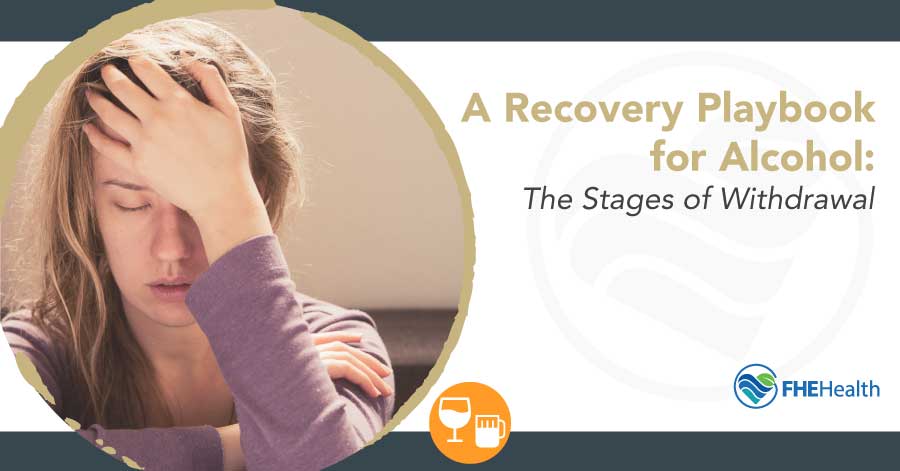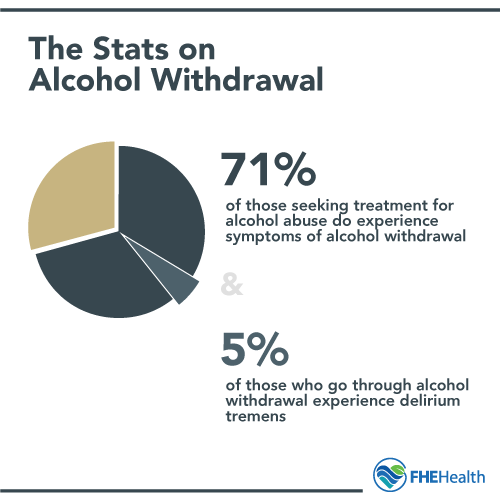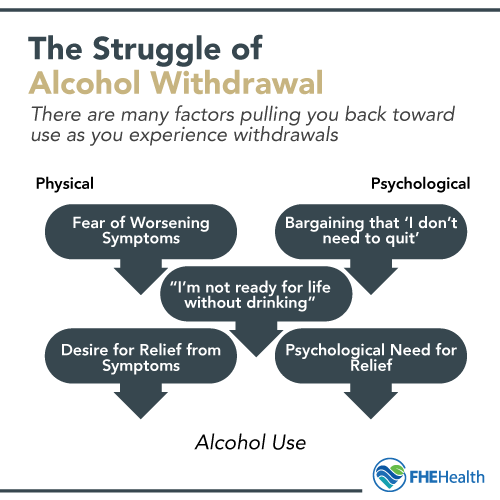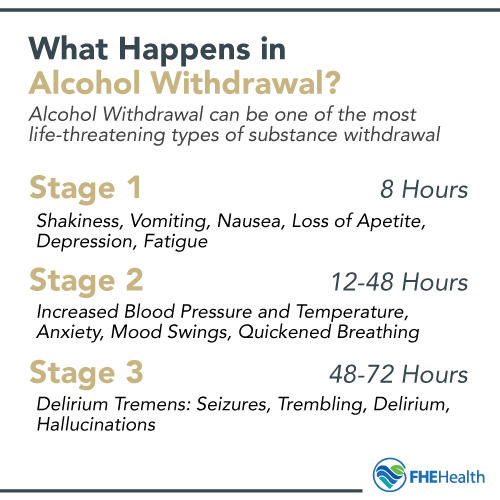
Understanding the stages of alcohol withdrawal is essential to helping a loved one into recovery or preparing yourself for what’s to come. Each year 88,000 people in the United States die from alcohol-related causes, according to the National Institutes on Alcohol Abuse and Alcoholism.
Undoubtedly, many of these people tried to stop at some point. When they did, the pain and discomfort that comes from withdrawal may have pulled them back into use.
By understanding the steps of alcohol withdrawal, drinkers can see beyond them and, in many cases, continue to work toward improvement. That could save a life.
How Alcohol Creates Dependency

Withdrawal doesn’t happen to everyone who drinks. The hangover you have after drinking too much one night is not the same feeling as withdrawal from alcohol abuse. Instead, withdrawal occurs only when a person has developed a dependency and regularity in their use of alcohol.
When someone has an alcohol dependency, they typically rely on the substance physically as well as emotionally and psychologically. As a result, the brain emits overpowering cravings for alcohol. The nature of physical and psychological dependence are intertwined and can’t be wholly separated, but each aspect is worth examining on its own terms.
Physical Dependency
The human body is incredible at adjusting to its environment and intake to continue functioning. Consider the vastly different diets of a vegan and a sumo wrestler: the body has adapted in both cases to continue functioning despite vastly different lifestyles. Similarly, the body can become quite tolerant of regular alcohol use.
After months or years of introducing alcohol, the body expects this external chemical and has actually changed its regulation to accommodate it. It’s possible to develop a physical dependence on just one or two drinks a day, but most addictions stem from long periods of consuming large volumes of alcohol. The sudden exclusion of alcohol produces a severe imbalance in the body and a host of side effects. Further complicating the withdrawal process is the abrupt loss of any psychological relief that drinking provided.
Psychological Dependence
Alcohol is used for self-medication by many. Restricting access to it removes a stress-relief tool that becomes essential for those in active addiction, regardless of its negative physical effects. This increased stress along with symptoms of physical withdrawal (which can wreak their own form of psychological havoc) can be an overwhelming combination.
What Happens When That Chemical Is Removed?
When you take that substance away, the brain isn’t able to function according to the familiar patterns associated with active addiction. Intense cravings can make it hard to even think about anything besides alcohol.
Withdrawal symptoms begin as well. All of this occurs because the brain’s chemistry demands access to the substance. It is estimated that as many as 71% of patients seeking treatment for alcohol abuse experience symptoms of alcohol withdrawal.
Stages of Alcohol Home Detox and Stages of Medical Detox

Before talking more about alcohol withdrawal, it’s important to consider the location of the detox. Withdrawal occurs when the body is detoxing, or removing the substance from itself and fighting off the changes.
When you try to detox at home, you might find success, but you are more likely to experience intense pain, more life-threatening risks and a much more difficult time outlasting the ‘peak’ of symptoms. That’s because you don’t have medical or psychological support to help you. It’s very hard, if not nearly impossible, to detox successfully like this. It’s also potentially life-threatening if you are one of the 5% of alcohol abuse patients who experience delirium tremens.
However, in a medical detox facility, there’s more control. Your doctors monitor your health to ensure you are comfortable and safe, and the withdrawal symptoms are mitigated.
The on-staff nurses and medical oversight work closely with you to ensure your pain is managed. Though it’s still not easy and takes time, medical detox is more successful because your symptoms are more bearable and you have support.
The Onset of Alcohol Withdrawal
During the first stages of alcohol withdrawal, a person will feel uncomfortable. It can begin to occur within 24 to 48 hours, or sometimes much sooner. You may feel a rapid heartbeat, a sense of nervousness, and sweating.
Some people have tremors, develop a fever, or cannot sleep. Blood pressure changes too. This is the body’s immediate reaction to not having alcohol.
During this time, most people are hard-pressed not to drink. The brain stimulates the body to encourage access to the substance and fight with the change.
The Stages of Alcohol Withdrawal

The stages of EtOH withdrawal happen over the first few days of not having access to the substance. During this process, the body and brain are working against each other and may create psychological changes too.
The Symptoms of Alcohol Withdrawal You’ll Likely Experience
Take a closer look at what can happen. Remember that every person is different depending on their level of use and individual sensitivity, which means you may not follow this timeline.
Initial – Six to 12 Hours After Your Last Drink
During this time, you may start to feel the emotional tug to drink. Agitation and anxiety increase. You may develop a headache.
Some people begin to vomit. Others shake. Emotionally, you may begin to feel depressed and anxious about what is to come.
12 to 48 Hours After Your Last Drink
During this time, the pain becomes harder to overlook. You may also feel a bit more disoriented and confused. It’s hard to focus on what’s happening or what you need to do. Many experience increased blood pressure, temperature, and mood swings.
Hand tremors are common. In some situations, you may also develop seizures. You shouldn’t be alone during this time or going forward.
48 Hours and Later
This is where the real risks to your health are likely to happen, though, for some, they may occur sooner. During this time, your body is experiencing the full effects of functioning without alcohol. Operating without alcohol means your body is still overcompensating and reacting to the reality that there is none. Your body’s immune system is reacting to the symptoms meaning your blood pressure, heart rate and nervous system are all heightened. You may experience seizures, nausea, and fatigue.
Delirium Tremens
Delirium Tremens is a severe condition that 5% of those with dependence will experience. It includes hallucinations and severe seizures. Any patient who experiences DTs needs medical oversight, as the condition is life-threatening.
Counteracting the Symptoms – When to Get Help
It’s not easy to manage these situations on your own. You may try to sleep through it, but that’s not likely to be possible since your body is going through a, sometimes violent, experience in reaction to the withdrawal.
It is better to be in a medical facility where your care can be monitored and any life-threatening risks are removed or controlled. Patients find that medical care like this is critically important.
What can happen during detox that your doctors and staff can manage?
- Pain is a common experience. You may have body aches, intense cramping, and “all over” pain. Medications can be used to reduce these symptoms, keeping you more comfortable.
- Nausea and vomiting can lead to dehydration. Proper fluid intake during detox is a critical component of helping your body to recover.
- Anxiety and fear are not uncommon either. In this situation, your doctors and therapists are there to support you, encourage you, and help you feel safe.
- Insomnia may occur in some people. Providing you with non-addictive forms of medication to help you sleep is possible.
- Hallucinations and disorientation can occur in some people. While providing a safe environment, anti-psychotic medications may be necessary for some people as well.
- Seizures and tremors, in extreme cases, can be treated in a medical facility. This includes providing medications to minimize damage to the brain and organs during these events.






